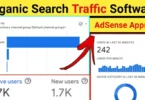Introduction to User Agents
Contents
- 0.1 Introduction to User Agents
- 0.2 Understanding Random User Agents
- 0.3 How User Agents Work
- 0.4 Why Randomize User Agents?
- 0.5 Random User Agents for Web Scraping
- 0.6 Random User Agents in SEO
- 0.7 Types of User Agents
- 0.8 How to Implement Random User Agents
- 0.9 Risks of Using Random User Agents
- 0.10 Best Practices for Using Random User Agents
- 0.11 Popular Tools for Randomizing User Agents
- 0.12 How to Check Your User Agent
- 0.13 User Agent Spoofing
- 0.14 Real-Life Applications of Random User Agents
- 0.15 Conclusion
- 1 Download File
In today’s digital world, every time you open a web browser, an invisible little piece of information called a User Agent quietly announces itself to the websites you visit. But what exactly is a user agent, and why does it matter?
A User Agent (UA) is a string of text sent from your browser to a website’s server that helps identify information such as the type of browser, operating system, and device you’re using. It’s a way of ensuring that websites can deliver the correct experience to each user based on their system. For example, the user experience might differ slightly on a mobile phone versus a desktop browser. Now, imagine this information being changed randomly — that’s where Random User Agents come into play.
Understanding Random User Agents
What Are Random User Agents?
A Random User Agent is a user agent string that changes automatically with each request or session. Instead of sending the same user agent string every time, you send a random one, masking your real browser, device, and operating system details. This randomness can prevent websites from recognizing and tracking you.
Purpose and Benefits of Random User Agents
Using random user agents has several advantages:
- Enhanced privacy: It helps mask your identity online, making it harder for websites to track your activities.
- Security improvement: It prevents malicious websites from exploiting specific vulnerabilities tied to your browser or OS.
- Avoid detection: In activities like web scraping, randomizing user agents can prevent websites from blocking you.
How User Agents Work
User Agent String: Explained
The user agent string is essentially a line of code that your browser sends to a website. This string tells the website vital information, like which browser version you’re using, your operating system, and sometimes even the device type.
Anatomy of a User Agent String
A typical user agent string might look something like this:
Mozilla/5.0 (Windows NT 10.0; Win64; x64) AppleWebKit/537.36 (KHTML, like Gecko) Chrome/91.0.4472.124 Safari/537.36
It contains:
- Browser type and version (e.g., Chrome 91)
- Operating system (e.g., Windows 10)
- Engine (e.g., WebKit)
Examples of Common User Agent Strings
- Desktop:
Mozilla/5.0 (Windows NT 10.0; Win64; x64) - Mobile:
Mozilla/5.0 (Linux; Android 9; Pixel 3)
Why Randomize User Agents?
Avoiding Detection by Websites
Websites can detect repeated user agent strings, flagging your activity as suspicious, especially during processes like web scraping. Randomizing user agents helps you avoid detection.
Enhancing Privacy and Security
Randomizing user agents protects you from being tracked online. By frequently changing your user agent, it becomes much harder for advertisers, trackers, or hackers to build a profile on your browsing habits.
Preventing Tracking and Fingerprinting
Some websites use techniques like browser fingerprinting, where the combination of your user agent, plugins, and browser settings is used to uniquely identify you. Random user agents make this fingerprinting less effective.
Random User Agents for Web Scraping
Why Random User Agents Are Essential for Web Scraping
Web scraping, the process of extracting data from websites, often involves making repeated requests to a server. Without random user agents, websites can quickly identify and block scraping activities by detecting patterns.
Web Scraping Ethics and Legal Concerns
While web scraping is a powerful tool, it’s important to be aware of the legal and ethical concerns. Always ensure you’re scraping public data, and respect the website’s terms of service.
Random User Agents in SEO
Using Random User Agents for SEO Purposes
In SEO, random user agents can help prevent websites from detecting automated bots used for tasks like monitoring competitor rankings or gathering keyword data.
Impact on Search Engine Ranking
Although random user agents won’t directly improve search engine rankings, they can help gather unbiased data during SEO analysis without being flagged by search engines or competitors.
Types of User Agents
Desktop User Agents
Commonly used by browsers like Chrome, Firefox, and Edge on desktops and laptops.
Mobile User Agents
Specific to devices like smartphones and tablets, mobile user agents signal websites to display a mobile-friendly version.
Bot and Crawler User Agents
Search engines like Google and Bing use special user agents to crawl and index websites. These bots announce themselves as such through their user agent string.
How to Implement Random User Agents
Browser Extensions for Random User Agents
There are several browser extensions available that automatically randomize your user agent with each new session. Examples include:
- User-Agent Switcher
- Random User-Agent
Programming Languages and Tools for Randomizing User Agents
For developers, there are libraries available in Python, JavaScript, and other programming languages that can help randomize user agents programmatically, such as:
- Python’s
fake_useragentlibrary - JavaScript’s
puppeteer
Risks of Using Random User Agents
Potential for Being Blocked
Some websites actively block requests from known bot user agents. If you’re using random user agents for scraping or automation, ensure your chosen agents aren’t blacklisted.
Compatibility Issues with Websites
Not all websites are friendly to every type of user agent. Using an inappropriate or outdated user agent could result in a website not displaying correctly.
Legal Risks and Considerations
Randomizing your user agent for malicious purposes, like unauthorized web scraping or bypassing security measures, could result in legal action or penalties.
Best Practices for Using Random User Agents
Frequency of Changing User Agents
It’s wise to change your user agent regularly, especially during activities like web scraping. However, changing too often could raise suspicion.
Avoiding Suspicious Behavior
If you’re randomizing your user agent, ensure that other behaviors (like making requests at a human-like pace) match to avoid detection.
Popular Tools for Randomizing User Agents
List of Browser Extensions
Some of the best browser extensions for randomizing user agents include:
- User-Agent Randomizer
- Random Agent Spoofer
Programming Libraries and APIs
For developers, tools like Scrapy, Selenium, and BeautifulSoup support user agent randomization.
How to Check Your User Agent
Tools to View Your Current User Agent
You can view your current user agent using online tools like:
- WhatIsMyUserAgent.com
- UserAgentString.com
Verifying the Effectiveness of Random User Agents
Check if your user agent is successfully randomized by revisiting these tools after each change.
User Agent Spoofing
What Is User Agent Spoofing?
User agent spoofing is when you intentionally change your user agent to impersonate a different browser, operating system, or device.
Differences Between Spoofing and Randomizing
While randomizing changes your user agent periodically without a specific target, spoofing is done to mimic a particular device or browser deliberately.
Real-Life Applications of Random User Agents
Use Cases in Cybersecurity
Random user agents are often used to evade detection by cybercriminals or to protect sensitive operations from being monitored.
Applications in Competitive Analysis
Marketers and analysts use random user agents to track competitors without being flagged, enabling them to gather insights anonymously.
Conclusion
Random user agents are a powerful tool for enhancing your online privacy, improving security, and avoiding detection in activities like web scraping. While there are some risks, using these tools responsibly and following best practices ensures a safe and productive browsing experience. Everyone should be aware of how user agents impact their internet activity.






